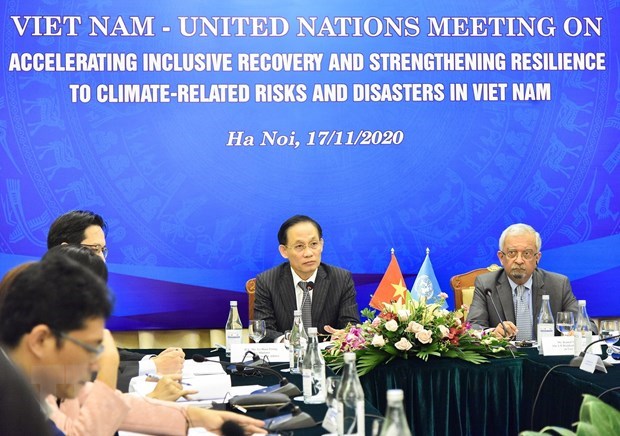Workshop discusses Viet Nam-UN cooperation framework for 2022-2026
Deputy Minister of Foreign Affairs Le Hoai Trung and Kamal Malhotra, UN Resident Coordinator in Vietnam, co-chaired a seminar on building the Viet Nam – UN development cooperation framework in 2022-2026 in Ha Noi on 2 December.
 |
| The Viet Nam - UN meeting on accelerating inclusive recovery and strengthening resilience to climate-related risks and disasters in Viet Nam on 17 November , 2020 (Photo: VNA) |
During the workshop, the two sides reviewed the implementation of the Viet Nam-UN One Strategic Plan (OSP) for the 2017-2021 period, and proposed orientations, priorities and solutions to enhance the UN’s support to Viet Nam to successfully implement its socio-economic development strategy in the 2021-2030 period, the socio-economic development plan in 2021-2025, and the 2030 Agenda on sustainable development.
Trung highlighted the extensive and effective cooperation between Viet Nam and the UN, saying that the OSP 2017-2021 is an important and practical cooperation framework that has assisted the Vietnamese Government in solving prioritised issues in socio-economic development and implementing the SDGs, as well as Viet Nam’s other important international commitments.
Viet Nam will approve a socio-economic development strategy and plan in 2021 - the final year of implementing the OSP 2017-2021, he said.
The two sides are urgently preparing to build a new development cooperation framework, ensuring a close link with national strategies and plans on socio-economic development, while making better use of comparative advantages of UN organisations in the new situation, Trung added.
For his part, Malhotra affirmed the UN is committed to supporting Viet Nam in its socio-economic development, realising the SDGs, and enhancing its role and position in the region and the world.
Viet Nam always leads the implementation of the UN’s “Unified Action” initiative, he said.
In his conclusion, Trung suggested the UN increase policy consultancy, share knowledge and experience, as well as provide support for Viet Nam in socio-economic management, especially economic restructuring and renovation of growth model, infrastructure and urban development, high-quality human resources development in close connection to market demand; green and circular economic development, resilience to climate change and extreme weather, biodiversity protection, water security and sustainable marine economic development, during the process of building a development cooperation framework for the 2022-2026 period.
The Ministry of Foreign Affairs is ready to act as a bridge connecting cooperation between Vietnam’s relevant ministries and agencies with the UN in this matter, he affirmed.
Participants also proposed priority areas for cooperation with the UN, including climate change adaptation, disaster risk mitigation, water resources, and improving living conditions of ethnic minority communities, fighting gender violence, aging population, school hygiene, nutrition for children, digital transformation, and sex education.
The OSP 2017-2021 is based on the three principles of inclusion, equity and sustainability. It is aligned with the country’s socio-economic development strategy for 2011-2020, socio-economic development plan for 2016-2020, the Sustainable Development Goals (SDGs), as well as international human rights commitments of Viet Nam.
With an estimated budget of 423 million USD, the OSP 2017-2021 prioritises four focal areas shaped on the basis of the key themes of the SDGs (people, planet, prosperity and peace).
Source: VNA